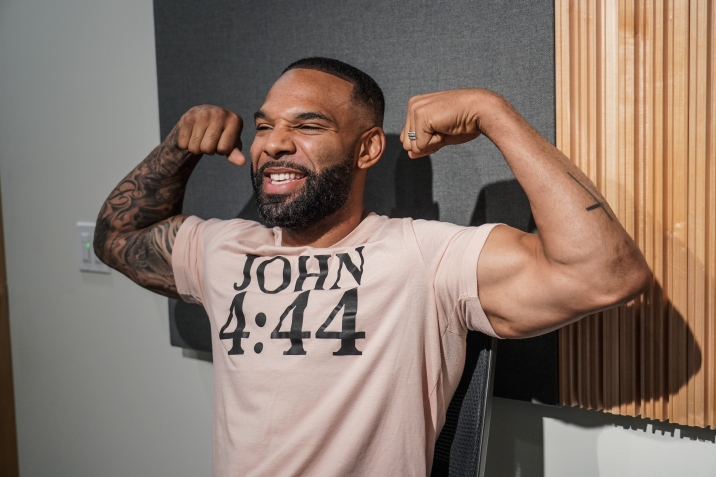| Most Important Thing About You
|
|
| Thursday, September 19, 2019 | |
It’s not every day you get asked to shoot photos of an NFL star. But it happened this week when former running back Matt Forte visited Moody Radio’s studios for an interview. At age 32, Matt is still tall, still buff, and—frankly—an intimidating presence. Chicago fans easily remember watching him blasting through tacklers, spinning past brute defenders, and carrying the Bears’ offense—game after game (9,796 career yards). No matter how you look at him, Matt Forte is impressive. While most running backs last less than three seasons, Matt played ten. And two of those seasons, he was elected to the Pro Bowl.
The guy could run and catch, being one of only three players in the NFL’s “1,000-yard-rushing, 100-catch-season club.” Imagine having a career average of 4.2 yards per carry, 54 career rushing touchdowns, and 21 receiving touchdowns. So what’s the most important thing you should know about Matt Forte? It’s this: Matt is a real-deal follower of Jesus Christ. Snapping pictures as he spoke, I was impressed with his command of Bible passages and stories. That’s something you wouldn’t encounter on Monday Night Football or ESPN. Nor would you see something like that in a Sports Illustrated story about his career.
Matt spoke about the importance of not just having a Bible, but really reading that Bible—digging in for yourself and bulking up on biblical truth. All of which leads me to ask a simple question. What’s the most important thing about you? Is it the workplace “touchdowns” you’ve scored? Is it the social status you’ve reached? The money you’ve made? The car you drive? What do others observe as the driving force in your life? Is it your stuff—or your Savior? It’s easy to claim we put God first—but our friends and family know the truth. They know what we rush to the second we finish dinner, or when we have a free Saturday. I’m learning it’s disturbingly easy to let my priorities get out of whack. Easy to go after the wrong things with the most zest. Best heed the familiar advice of Jesus who urged us…
|
|
| Of Insects and Iniquities
|
|
| Thursday, September 12, 2019 | |
When Africans visit the USA, I wonder what stands out to them. What makes them scratch their heads and say, “Why?” As for what makes this American scratch his head while visiting Africa, that I can answer in one word: insects. Ten trips to the vast expanse called Africa have done nothing to dampen my love and admiration for this massive continent. But frankly, I do wonder about the bugs. I’ve come across insects so bulbous and so massive, their wingspans appear to rival small aircraft (well, almost that big). Indeed, Africa’s flying insects are an air force unto themselves. Visiting a restroom in Ghana, I heard a sound like dishes being shoved about in a china cupboard. Turned out it was “merely” a single large flying something or other. But here's the kicker. Despite the hordes of gigantic insects, you will find comparatively few screens on windows and doors. In homes wealthy and not so wealthy, screens are a "maybe" item at best. Why? Aren’t these people bothered by the insects? Why don’t more of them choose to protect themselves from the onslaught of creepy crawlers? I wonder if they are so used to beetles the size of small birds, they don't even notice them.
My missionary friend, Dr. Bill Rapier, founder of African Leadership Development reminded me, "If you've never had it (a window screen), you probably don't know there is such a thing!" You can't miss what you've never known. Plus, Bill reminds me, there is widespread use of window sheers that does help with the bugs. Allow me a hairpin turn as I ask, why don’t more of us put up more of a protective barrier against the sin all around us? The doors and windows of our souls are often left entirely open and unprotected. We pay little heed to the little—and large—critters that eat away at our holiness, gnaw at our peace, and sting us with the reality of our failures. I'm amazed at the number of times I've fallen for the same sins. I'm embarrassed by the way the confession of those sins sounds ridiculously repetitive. Is it possible we’ve become so familiar with sin, it no longer bothers us? Any chance we may have become so used to some sins we no longer screen them out? Just wondering and just struggling—like you, perhaps. Thanks for letting me…um…bug you. |
|
| A Very Small Rudder
|
|
| Thursday, September 05, 2019 | |
How large does a rudder need to be to steer a ship? Perched on the upper deck of the Volunteer, I sensed the hull of our 29,000-pound boat gliding noiselessly through the shaded waters. The complete ease of our ride belied the sweat equity invested by thousands of workers over 12 years. Consider—at a pay rate of $1 per day, they dug the 97 miles of the Illinois & Michigan Canal entirely by hand. After the canal’s completion in 1848, ships transporting fruits and vegetables and other goods were all hauled by mules. Calling us back to those simpler days, a single mule tugged our 75-foot boat. Its hooves dimpled the dust of what is today a bike path, the guide rope briefly dancing in the water now and then. Strolling to the back of the ship, I studied the man operating the tiller. Noting that he'd offered a little boy a turn at steering, I wondered if he’d also indulge a bigger boy. And there I was, hands on the tiller, guiding the boat through the narrow canal. Right away, I noticed how difficult it was to steer because the upper deck blocked most of the forward view. You had to stick your head over the sidewall to see what was ahead. Fortunately for me, the captain performed that task rather capably and told me how far to rotate the tiller. I moved it more frequently and at a greater sweep of range than you might imagine.
At one point, I asked the captain how big the rudder was. “Two foot by two foot” came the reply. A mighty small chunk of metal steering a rather large boat, I thought. But isn't that the very point of the warning in James chapter three, regarding the power of the tongue? Verse four cautions, "Look at the ships also: though they are so large and are driven by strong winds, they are guided by a very small rudder wherever the will of the pilot directs." That “very small rudder” holds enormous potential for good or evil. Verse eight summarizes, “No human being can tame the tongue. It is a restless evil, full of deadly poison.” You already know life is not a pleasurable ride down a shaded canal. You alone know the daily moments that tempt you to steer your speech in the wrong direction. I’m with you, for sure. Maybe the prayer of Psalms 141:3 is the one we need most:
|
|
| Caleb the Most
|
|
| Thursday, August 29, 2019 | |
Kids and Supper. You never know what’s on the menu—and I’m not talking about food. I speak of the delectable dialogue that often spills on to the table (along with the occasional glass of milk). The other night over dinner, our daughter and son-in-law engaged the family in a conversation about the gospel. Eleven-year-old Josie was there. So were Caleb, age seven, and Lucy, who is five. It wasn’t long before someone quoted Romans 3:23: “For all have sinned and….” Boom! At that precise moment in the verse recitation—before they could go any further than that first phrase—Lucy interjected, “But Caleb the most!” While five-year-olds are not generally known for their tact, Lucy's mouth has a near-legendary capacity for articulate assault. And there it was: Lucy's assessment of her older brother’s sin record: “the most.”
Might be fun to drill deeper with Lucy. Does she mean Caleb has the most sins of any of her siblings? More than anyone in her entire family? Or is she thinking more globally—as in Caleb has the most sins of anyone on the planet? The story takes a deeper dive into comedy when you grasp the truth about Lucy. For most of her first four years, if Lucy were unhappy with her older brother Caleb, she would bite him. And not just a little. It grew to the point where poor Caleb would warn strangers entering their front door, “hers a biter.” James’ warning to “remove the plank from your own eye before complaining about the speck in another” comes to mind. Indeed, "All have sinned…." Including me. Including you. Including Lucy.
|
|
| A Cup of Compassion
|
|
| Thursday, August 22, 2019 | |
Flames of fury. Choking smoke. Paris in shock. Last April, we gawked at our phones, tablets, and TVs as the iconic Notre Dame Cathedral smoldered. The sight prompted me to grab a book that had long sat on my shelf unread: "The Hunchback of Notre Dame." Victor Hugo’s 1831 novel unfolds the epic tale of a beautiful gypsy, Esmeralda. Pursued by the evil archdeacon Claude Frollo, she is protected by Quasimodo, Notre Dame's disfigured bell ringer. His one eye, bulging forehead, and trademark hump make for a grotesque character that evinces shock and shun from nearly all. Quasimodo "has a back like a dome and legs like twisted columns," said one. Ultimately, he endured the pain of a public "pillory" in front of a seething crowd. This meant he was shoved into an iron cage which dangled in the ferocious afternoon sun, his feet and wrists shackled while his back endured lash after lash from a whip. Then it was the public’s turn to humiliate.
Quasimodo cried out for water. In response, someone hurled a stone at his head. Another flung a broken pitcher at his chest. Not one soul in the jeering mass had so much as a drop of pity for the bell ringer. That’s when Esmerelda stepped forward. She produced a gourd of water and held it up for the tortured man. He drank freely—as a single tear coursed down his misshapen face. Hugo writes, “It would have been a touching sight anywhere—this beautiful, fresh, pure, charming girl, who was at the same time so weak…hastening to the relief of so much wretchedness, deformity, and malevolence. On a pillory, the spectacle was sublime." You and I live in a day where the crowd is increasingly heartless—even hostile—toward anyone different or slow or less than beautiful. Best not be overweight. Or wrinkled. Or wearing the wrong clothing labels. Empathy is in short supply. All around us are people thirsty for a small cup of compassion. I ask, who is the Quasimodo in your life—the one that others have neglected, shunned, or beaten down? Swimming in waterfalls of grace from our Savior—will we not share a cup with our Quasimodo? I dare you. Do something today that’s not just good or great—but sublime. Share a cup of compassion with someone who desperately needs it.
|
|
| Records per page First Prev 46 47 48 49 50 51 52 53 54 55 of 127 Next Last | |
 Jon Gauger Jon Gauger |
|||||||||||||||
| Thursday Thought | |||||||||||||||
|
|
|||||||||||||||
Recent Posts
|

.jpg)



